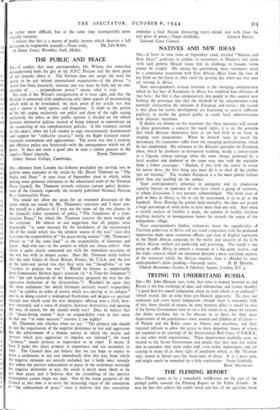NATIVES AND NEW IDEAS
SIR,—A letter in your issue of September 22nd, entitled "Natives and New Ideas," professes to confine its statements to Rhodesia but deals with such general African issues that its challenge in broader terms cannot be evaded. My excuse for questioning these statements must be a continuous association with East African affairs from the time of my birth on the Coast in 1891 until the present day when my two sons are serving in Africa.
Your correspondent's natural irritation at the sweeping condemnation which he has met of Europeans in Africa has rendered him oblivious of two facts: the first is that comparatively few peoplein this country now harbour the grotesque idea that the methods of the concentration camp normally characterise the relations of European and native ; the second is that plans for native development are beginning to receive sufficient publicity to enable the general public to credit local administrations with altruistic intentions.
If doubts are thrown on his statement that these measures will ensure in three generations a capacity for equal rights, it is on the grounds that black Africans themselves have as yet had little or no hand in shaping such programmes. When he himself turns to attack the missionary, his statements suffer from the sweeping generalisations which he has condemned. His reference to the Africans' partiality for European dress, which he attributes to missionary teaching, recalls a conversation in a Uganda railway carriage when the same charge, preferred by a local resident and deplored in the same way, met with the rejoinder from a fellow passenger: "Madam, if you wish the native to retain his native dress, the first thing you must do is to shed all the clothes you are wearing." The resident European is a far more potent fashion plate than any teaching on the subject.
Your correspondent's reference to polygamy and its productive capacity betrays an ignorance of two facts which a group of scientists, at whose discussions I was present, acknowledged. The birth ratio of girls to boys in Africa, as far as can be ascertained, is 53 to 47 in the hundred. Even dlowing for greater male mortality, this does not permit a large percentage of adult males to have more than one wife. And when a careful analysis of families is made, the number of healthy children teaching maturity in monogamous homes far exceeds the ouput of the polygamous village.
Your correspondent's further statements about the superficiality of Christian profession in Africa will not stand comparison with the profound impression made upon numerous officers and men of English regiments in the North African campaign by the reality and sincerity of the faith which African soldiers are professing and practising. The world is not going to suffer Africa to remain a museum or a big game reserve, and the wider contacts which are imminent demand a more searching analysis of the resources which the African requires, than is afforded by your


























 Previous page
Previous page